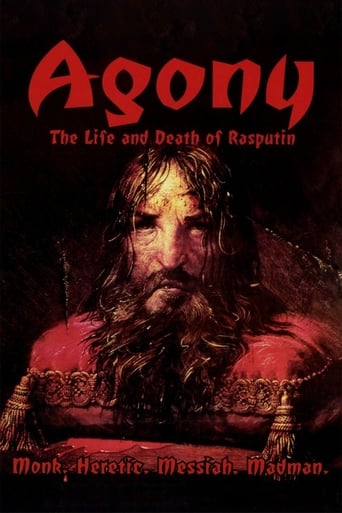Kirpianuscus
a special film. at first sigh, about a man who was in many others movies used as exotic character. in this case , he represents only the pretext. for a story about a profound crisis, for the chronicle of the fall premises of a monarchy. in same measure, it is a manifesto. the reaction of Soviet authorities about it is the basic argument. because the realities presented by Elem Klimov are against the entire portrait of Tsarist regime presented by official sources. and Rasputin himself is not exactly the expected one. but the film is, in same measure, less than a tool of political opposition. it is an analysis of Russia. the Russia from yesterday and today. the Russia of illusions and leaders and incertitude, hope and faith. and this facts does it a special film. because the fragments of documentary film reminds the powerful shadows behind the artistic purposes.
Prokievitch Bazarov
RASPUTIN did not die easily. As his assassins stood by impatiently, Rasputin, the Czarina Alexandra's favorite holy man and one of the most hated figures of pre-revolutionary Russia, stuffed himself with cyanide-laced cakes and washed them down with a sweet wine that had been similarly spiked. His only comment was that the wine was rather poor. The conspirators then shot him repeatedly. He stumbled and fell, but didn't give up his ghost. The murderers bludgeoned him and, at last, when he had lost consciousness, they dropped the body into the frozen Neva River. Later, an autopsy revealed that Rasputin's lungs were full of water. He'd simply drowned. That was in December 1916 in St. Petersburg. Rasputin still isn't dead as far as movie makers are concerned. He has been played by Conrad Veidt (1930), Lionel Barrymore (1932), Harry Baur (1938), Edmond Purdom (1960), Christopher Lee (1966), Gert Frobe (1968) and, most recently, by Tom Baker in the 1971 spectacle ''Nicholas and Alexandra.'' Here he is the subject of a curious Russian film, ''Rasputin''. I use the word ''new'' loosely. ''Rasputin'' (originally titled ''Agoniya'') was made many years ago but was withheld from release in the Soviet Union, when it was cleared in what some perceived as a liberalization under by Mikhail S. Gorbachev, the new Soviet leader. It is easy to understand why the Russians might have had uneasy thoughts about the film, directed by Elem Klimov and with Alexei Petrenko in the title role. In spite of a prologue of newsreel clips accompanied by voice-over narration, which tries to put the story of the ''mad monk'' into proper context, this film might make one believe that the Grigori Rasputin was the major cause of the 1917 revolution, rather than a symptom of the corruption that made revolution inevitable. Except for the newsreel footage, and a sequence showing Rasputin visiting his peasant family in Siberia, the movie is almost exclusively concerned with showing us low-life among the aristocratic St. Petersburg swells and their hangers-on, including Rasputin. In this, ''Rasputin'' is comparatively adventurous, even risky, for a Russian film. It also gives us an almost sympathetic picture of Czar Nicholas, presented as a befuddled, weak but essentially decent man, dependent on his superstitious wife. She, in turn, is seen as being bewitched by Rasputin, whom she believes to be her conduit to God, as well as the only person capable of treating her hemophiliac son. ''Rasputin'' is less a coherently dramatized history than a series of sometimes vivid tableaux vivants. At the center is the remarkable figure of Mr. Petrenko's Rasputin, a huge, heedless, messy, out-of-control zealot, given to epic debauches, severe depressions and mystical revelations. He's a man who finds himself with more power than he knows what to do with and with no real plans to put into effect. He's an opportunist who may well believe in his own powers. Never, however, does the film make any effort to analyze him or to suggest that, given the temper of the times, the emergence of such a man was a foregone conclusion. At times, this ''Rasputin'' suggests nothing much more than a horror film, a somewhat politicized ''Exorcist.'' Mr. Klimov, the director, employs a sort of impressionistic cinema style, cutting back and forth between color footage and monochrome, between fictional scenes and newsreels and, in one of the film's most successful sequences (near the end), between a series of still photographs, some from the archives and some shot for the film. It is not always easy to follow the story, even if one has boned up on the accepted facts before seeing the film, but Mr. Klimov keeps the focus fairly narrow and short. With the exception of Rasputin, the historical figures are scarcely characterized, though Anatoly Romashin looks right as Czar Nicholas. Velta Linne, who plays the Czarina, looks more like a worried Russian peasant woman than the German princess who never felt at home in Mother Russia. Though it's a footnote to history, the life and death of Rasputin retains its fascination. Mr. Klimov does particular justice to the murder plot that ended Rasputin's life. As he stages it, to the sounds of ''Dixie'' on an old-fashioned Victrola, the assassination turns into a macabre slapstick comedy, one in which the victim keeps coming back to life to scare the wits out of the faint-hearted, desperate, high-born perpetrators.




